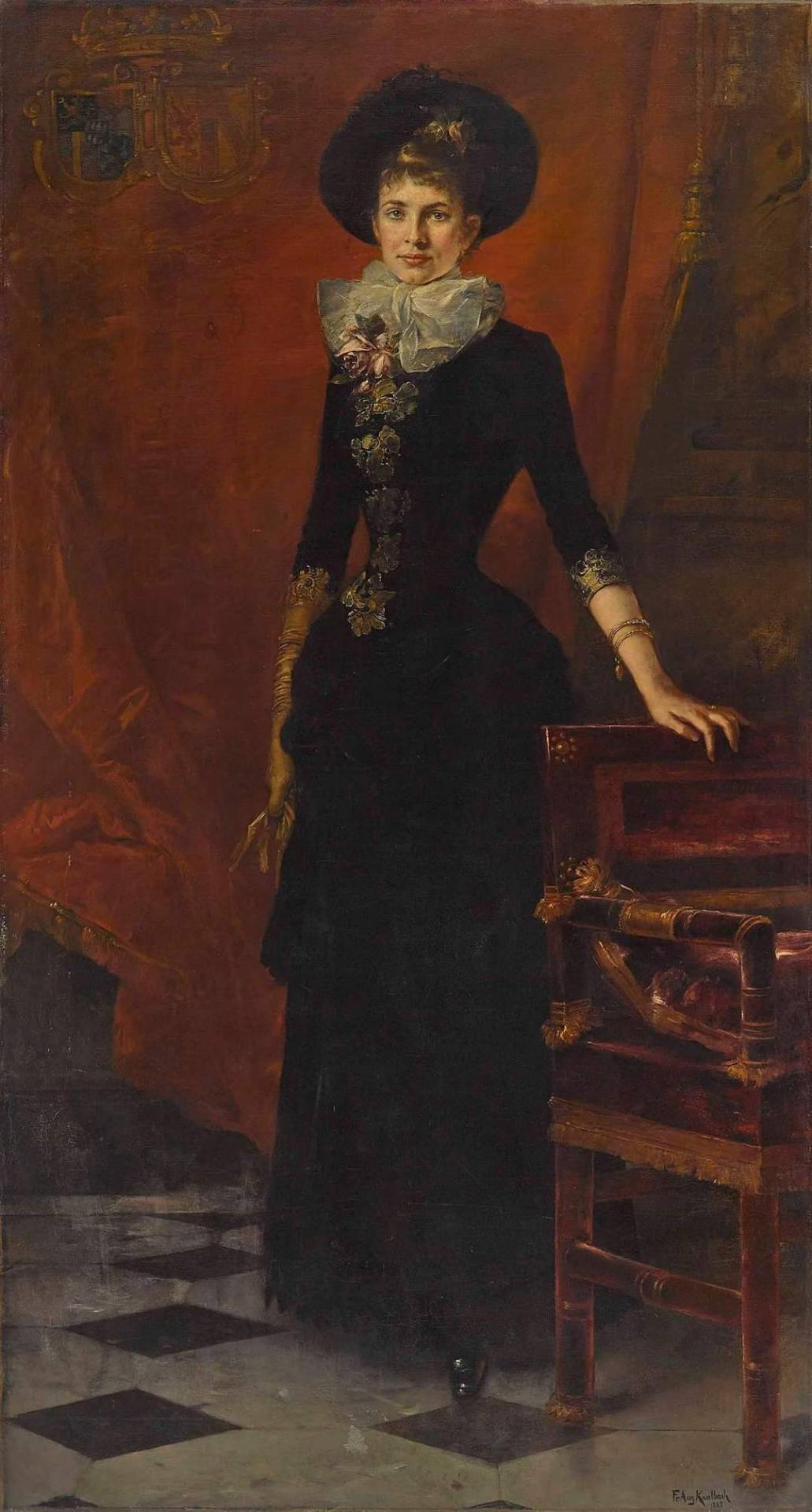#Archduchess Gisela
Explore tagged Tumblr posts
Text

“Sisi's daughters were absolutely stunning. ive seen lots of photographs and portraits but i can never forget their captivating beauty. especially gisela she was perfect!” - Submitted by autistic-weo-weo
20 notes
·
View notes
Photo

#Archduke Rudolf#Archduchess Gisela#1860s#habsburg#colorization#colorized#colorized photo#austrian imperial family
15 notes
·
View notes
Text


#from birth to death#esclarmonde lestrange#féchín lestrange#ermesinda gisela lestrange#riddle era#riddle era ocs#ocs#my ocs#archduchess sophie of austria#empress sissi
18 notes
·
View notes
Text

Letter from Archduchess Sophie to her daughter-in-law Archduchess Margarethe, on the Christmas Eve of 1857:
December 28, 1857 … Christmas presents downstairs with my children [the Imperial couple and their daughter Archduchess Gisela] went much better than we could have expected after our painful loss [the death of the couple's first child, Sophie, on May], as our dear, now only child softened all the melancholy memories with her so kind friendliness and joy. When her father carried her into all the splendors, she looked around in silent amazement, then standing at her little table, she looked closely at every toy, held a stuffed puppy, which set a clockwork in motion and which wriggled on all its limbs, calmly in her little hand and played delicately, so calmly and joyfully with all her splendors. Once she shouted for joy, which is her habit when she is happy, and the next morning every time she saw all her beautiful things again in the next room, only a few of which she gets to play with every day, she shouted for joy again! - When her mother said she had to go to bed on Christmas Eve, she went gently, without reluctance. She only slipped two bracelets, which her beloved grandfather and I had given her, off her arms with difficulty, thinking she would have to leave them with the toys and wanted to give them to Sophie Esterhazy [Oberhofmeisterin of the Empress], but she kept them firmly in her hands and after a few bows she went her way in a friendly manner.
Praschl-Bichler, Gabriel (2008). Unsere liebe Sisi. Die Wahrheit über Erzherzogin Sophie und Kaiserin Elisabeth (Translation done by DeepL. Please keep in mind that in a machine translation a lot of nuance may/will be lost)
[Pictured: Litography of Archduchess Gisela, by Adolf Dauthage, 1860].
#''our dear now only child'' :(#sophie of bavaria archduchess of austria#margarethe of saxony archduchess of austria#gisela of austria princess of bavaria#empress elisabeth of austria#franz josef i of austria#sophie of liechtenstein countess esterhazy
14 notes
·
View notes
Text


While we do not have official confirmation yet, showrunner Katharina Eyssen is currently preparing a third season of The Empress (2022).
We can see in her notes that we will probably meet Elisabeth's Hungarian lady-in-waiting Ida Ferenczy as well as Gyula Andrássy and a character named Konstantin. Another note hints at Crown Prince Rudolf and Archduchess Gisela being in the third season. Furthermore, we may explore Elisabeth going to Corfu alongside her mental health.
#The Empress#Die Kaiserin#The Empress (2022)#costume drama#historical drama#period drama#Katharina Eyssen#Ida Ferenczy#Gyula Andrássy#Gyula Andrassy#Crown Prince Rudolf#archduchess gisela of austria#Elisabeth in Bavaria#elisabeth of austria hungary#elisabeth of austria#german tv#german series#behind the scenes#Netflix
18 notes
·
View notes
Text

Princesses Elisabeth Marie and Auguste of Bavaria, daughters of Archduchess Gisela of Austria, by Heigl.
#princess elisabeth marie of bavaria#princess auguste of bavaria#wittelsbach#archduchess gisela of austria#habsburg#heigl#portrait
9 notes
·
View notes
Text
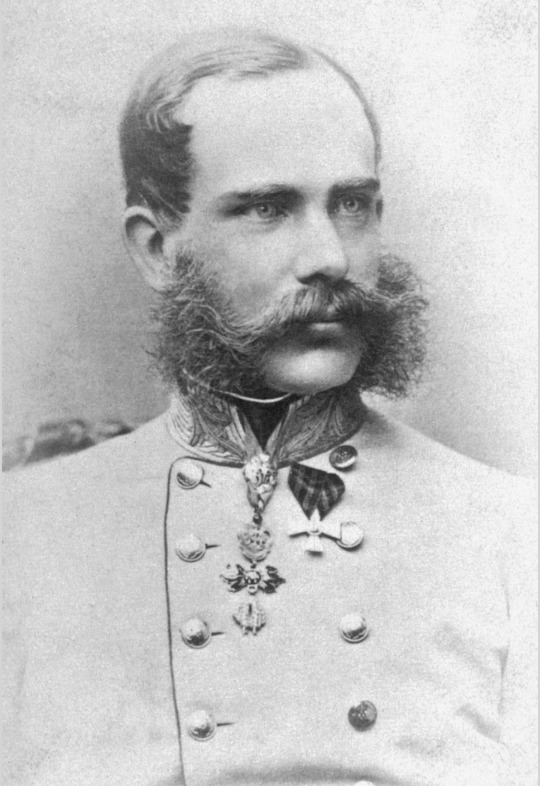
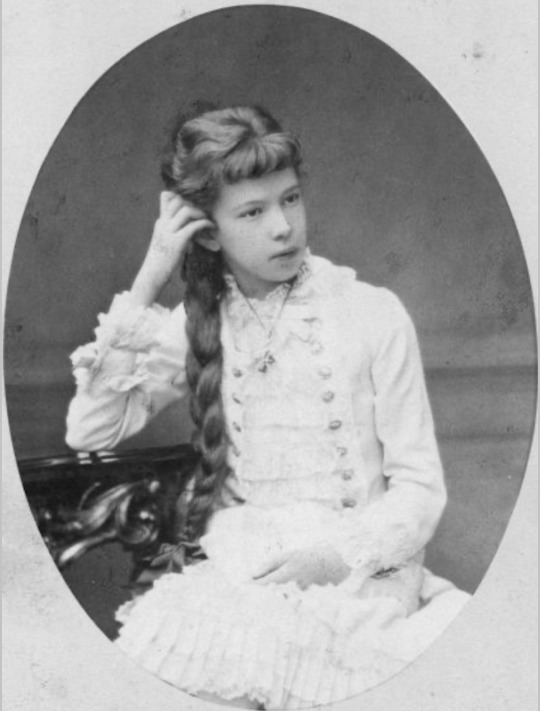
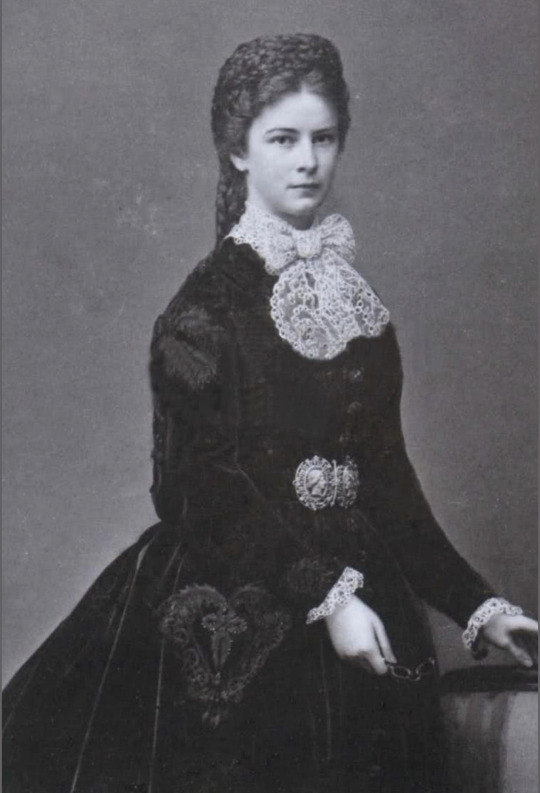
~ Rumors About Our Daughter ~ (fan fiction requested by @historical-epic)
Rumors questioning Archduchess Marie Valerie of Austria’s legitimacy have been circulating within the Austrian Court. What do her parents think about this? What do they do?
Characters: Archduchess Marie Valerie of Austria, Emperor Franz Joseph I of Austria, Empress Elisabeth of Austria
Valerie heard her mother talking to a random maid servant in the drawing room of their summer home Kaiservilla in Bad Ischl. Thought it sounded more like arguing to her.
“Don’t you dare make such treasonous accusations!” Elisabeth shouted, loud enough for 8 year old Valerie to make out what she said.
“Y-Y-Your Majesty….I didn’t mean to…I was just implying that”
“What, that my daughter is illegitimate? That her father is not The Emperor? How dare you!”
Valerie had never heard her mother this angry before. It was quite shocking, more shocking than the rumors of her own illegitimacy.
These rumors were swirling in and out of Kaiservilla for months now, mostly the fancy talk of lower servants. When the imperial family arrived, the servants had to be more careful about their gossiping and shut out their willful thoughts as these thoughts could imprison them for life, or even worse, death.
Emperor Franz Joseph I was married to Duchess Elisabeth of Bavaria, who later became Empress Elisabeth of Austria by marriage. But everyone close to her called her either Mother or Sisi.
Together they had four children. Archduchess Sophie, who died young, Gisela, Rudolf, and Marie-Valerie. They all lived somewhat happy lives although there were problems in all.
Franz and Sisi had to bear the burden of ruling an all powerful Austro-Hungarian empire, Rudolf had to bear the burden of being heir, Gisela had to bear the burden of being unloved by her parents (it was very complicated), and Valerie now had to bear the burden of various rumors spreading about who her real father was.
There are plenty of servants and nobles who live at Kaiservilla and that means that there are various mouths to blab whatever they want about whoever they want.
A few months ago, the topic of Empress Sisi and her lover Count Andrássy was being spoken about and somebody must’ve put together that Valerie might not have been her father’s daughter.
These were obviously just nonsensical rumors because Valerie was Franz’s child. She was legitimate.
But Valerie herself didn’t know that and neither did all of the servants who had been blabbing their mouths off for months.
“Get out of my sight! Sisi practically screamed at the frightened chamber maid who unfortunately gossiped at the wrong time to a footman.
The maid scurried off and Sisi sat down on the nearest chair and was trying to hold in tears.
“Mama..” Valerie walked in from the other room. “Was that maid talking about me?” She asked.
“Oh darling” Sisi held out her hands to embrace the trembling young girl who started to cry.
“Don’t pay any mind to what that filthy servant said. It was all lies and it wasn’t true at all.”
Sisi stroked her daughter’s unruly dark brown hair and continued to do so until Valerie broke the embrace.
“But Mama…I heard it all…I don’t know what this all means.” Valerie was on the verge of hysterics.
Seeing her mother so upset ignited something in her that is usually hidden away. It made her angry and confused and utterly upset.
“Valerie darling” Sisi soothed. “All you have to believe is that you are your father’s daughter, you are my daughter. If somebody said that you aren’t then shame on them!”
Sisi gave her youngest daughter a little playful slap which turned the sad frown on Valerie’s face into the wide smile that would be seen playing outside with her dogs or drawing pictures with her mother.
“You are Archduchess Marie Valerie of Austria, youngest daughter of Emperor Franz Joseph I of Austria, King of Hungary. That is who you are and you can’t listen to anybody if they say otherwise, especially the nasty servants who gossip.” Sisi softly placed a hand on Valerie’s face.
“Okay Mama, I love you very much.” The two hugged firmly again.
“Next time Valerie, don’t eavesdrop okay?” Sisi said strictly, but with a laugh.”
“Okay Mama!” Sighed smart Valerie as she skipped out of the room.
~
Later that night, when Valerie was doing her nighttime prayers, Sisi was informing Franz about the events of the day.
“Franz, darling,” Sisi spoke to her husband who was sitting calmly on the bed taking his boots off.
“Many people are questioning Valerie’s legitimacy, today I caught a maid servant gossiping with a footman. I’m greatly concerned.” Sis went over to sit next to Franz who wrapped his arm around her.
“Darling, you know those rumors are false. I remember the night we conceived. It couldn’t possibly be anyone else. What makes you so worried?” Franz said
Sisi wanted to say that the rumors were specifically stating that Count Andrássy was the suspected father and that she never did anything with him except one small kiss, but she couldn’t say that to her husband.
She loved Franz and Andrássy’s kiss brought her no affectionate feelings, minus disgust and anger, but this was just not the right time.
That was a story for another day.
Sisi decided to tell Franz the truth about half of the worries about this situation.
“I’m worried because Valerie was in the other room and she could hear me yelling at that maid.” Sisi was close to tears.
“She has never heard me that angry before and she came up to me afterword and was quite distressed...” Sisi wept into Franz’s arms while he gently stroked her back.
They might not have been passionate soulmates, but after all these years of marriage, Franz still loved Sisi, and the feeling was mutual.
“Sisi darling hush now, I will talk to her, I promise.” Franz stated his wife in the eye and gave her a gentle kiss on the forehead.
He then exited the room and let Sisi undress peacefully.
As Franz was walking to Valerie’s rooms, he couldn’t stop himself from thinking more deeply about the rumors.
Why would anyone think that Valerie is not my daughter?
Valerie heard a sudden knock on her bedroom door.
“Valerie, darling, it’s Papa, can I come in?”
“Enter.” Valerie spoke softly as her nanny calmly put the book away and exited the room.
Franz came in and slowly sat down on Valerie’s bed.
“What’s wrong Papa?” Valerie noticed the solemn look on her father’s usually joyful face. At least he was joyful when she was around.
“Valerie…” Franz spoke in a nervous but fairly calm tone. “Mother told me about what happened today.”
Valerie’s face fell into a sad frown.
“Does everyone think like that maid thinks?” She said desperately. “Mama says that I shouldn’t listen to them…but I did.”
“Oh Valerie my dearest,” Franz wrapped his daughter in a tight embrace and rocked her around like he did when she was a baby.
“Look in my eyes, Valerie, you are my daughter. Nothing can or will ever change that.” Franz was disgusted by these ugly rumors. His heart knew that Sisi could’ve and would’ve been unfaithful at times, and he could’ve been too. But he knew deep down in his heart that Valerie was his child, nothing could convince him otherwise.
“Papa is that really the truth?” Valerie asked longingly.
“Darling,” Franz cooed. “It will forever be the truth.”
“Oh Papa I love you so much!” Valerie gave her father a kiss on the cheek and a tight squeeze before hopping under her covers.
Franz kissed the little girl goodnight and exited calmly.
He knew that everything was going to be okay, and if not, he would take care of it.
~
#I hope you like this!#🤍#rumors about our daughter#fan fiction#historical-epic#history fan fiction#My fics#archduchess marie valerie#archduchess Marie Valerie of Austria#Marie Valerie of Austria#emperor franz joseph#empress elisabeth of austria#franz joseph i#Elisabeth of Austria#Austrian royal family
36 notes
·
View notes
Text
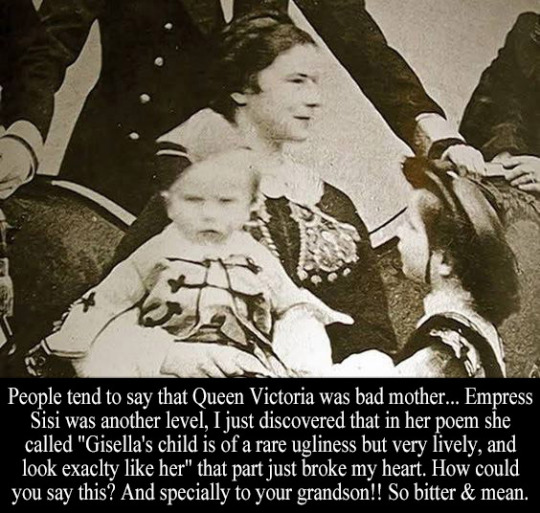
“people tend to say that queen victoria was bad mother… Empress sissy was another lever, i just discovered that in her poem she called "Gisella's child is of a rare ugliness but very lively, and look exaclty like her" that part just broke my heart. how could you say this? and specially to your grandson!! so bitter & mean 💔” - Submitted by abigaaal
48 notes
·
View notes
Text

Archduchess Marie Valerie about King Ludwig II of Bavaria:
18 June 1881. Oh! The King is supposed to come to Possenhofen today to visit Mama. He had an enormous magnificent bouquet sent to her with the query, when might he visit her? But it must be in the evening and no one is allowed to look at him! … but we will see him somehow anyway.
19 June 1881. No, is it possible … that … o no! The King … yesterday on 18 June 1881, yesterday I tell you, spoke to me … only me out of all of the children! no … no … but actually, yes. So: yesterday the King was supposed to visit Mama in Possenhofen at 7 oclock, and we (Amélie, Paula, Elisabeth, Countess Kornis, Siegfried, a Miss Tebr. and I) were watching from Count Angele’s room. But there was honeysuckle growing up to the window and I said I would throw a sprig down to the King; everyone said, no, then Mama came and I called out to her and asked if I could. Mama said she would fetch jasmine (because there is a long story connected with jasmine and the King), but oh! while Mama was getting the jasmine, the King came into the schloss himself to look for her. There was a kerfuffle. We ran to Siegfried’s balcony and Mama was already down below with the King and oh! she said that I, me alone, could come down so that she could introduce me, 0, me, and only me to him. O! I can still hardly believe it! But I came trembling and Mama handed me the jasmine before the door and now this incredible thing should actually take place. And I didn't even have time to put on my gloves and my dress (it was still the brown linen one) was dirty and creased. But I came out anyway … and gave him the jasmine with a very, very low curtsey! O! Great King, now you actually have the jasmine I gave you!!! He wanted to kiss my hand o! He asked me if Nazi was in Prague and I said: “Y…es!” He asked me if Gisela was here and I said: “No, she is in Munich.” He asked me whom I was up there with, whether they were my cousins and I said “Y…es.” He speaks very fast and unclearly and felt as embarrassed as | did. Mama invited us to use informal pronouns with each and he said: “But if so, then both of us, right?” And then I gave another courtesy and left. Of course, I was inundated with questions back upstairs, what it was like, what he said etс". …
10 notes
·
View notes
Photo
She looks exactly like her mummy Sissi here! 🥺❤

Archduchess Gisela of Austria was the second daughter and eldest surviving child of Emperor Franz Joseph I of Austria and Elisabeth in Bavaria. Gisela was married to Prince Leopold of Bavaria in Vienna. The couple photographed in 1900
47 notes
·
View notes
Text


Rudolf’s aunt, Archduchess Maria Theresia, also was the object of his infatuation. She was one of the six famously beautiful Braganza sisters and married to Archduke Karl Ludwig, who was 22 years her elder. She was the stepmother of Archduke Franz Ferdinand and Otto. Rudolf’s sister Gisela, already married in Munich, was the person to whom he confided his admiration for her. Feeling sorry for her beautiful aunt, she lamented with her brother, “What you are writing about Maria Theresia is really sad. One can conclude from this that she can not be happy. It’s too bad to be married to such an old man when one is still so young.” The “old man,” however, who was second in line as heir to the throne after the Crown Prince, was very jealous. Rudolf’s infatuation and his sympathy for the beautiful young archduchess can hardly have improved his already tense relationship with his uncle, who was known for his “clericalism.”
Hamann, Brigitte (2017). Rudolf. Crown Prince and Rebel (translation by Edith Borchardt)
[Pictured, left: Maria Teresa of Braganza, Archduchess of Austria, circa 1870s. Right: Crown Prince Rudolf of Austria, 1876. Via Wikimedia Commons]
#ngl this part in hamann's biography annoys me because she refuses to elaborate. did he explicitly told gisela he liked maria teresa?#bc the letter she quotes just seems to allude to rudolf being sad about a 17 years old marrying a 40 years old widower with four children#which is. a normal feeling to express? it can't just be that what made hamann believe he had a crush right??#later on she even claims that rudolf's type were women who resembled maria teresa - idk maybe he just liked brunettes?#maria teresa of braganza archduchess of austria#crown prince rudolf of austria#gisela of austria princess of bavaria#historian: brigitte hamman
9 notes
·
View notes
Text

New still of Jannik Schümann, Dominique Devenport, Arian Wegener and Kristina Schroeter as Emperor Franz Joseph, Empress Elisabeth, Crown Prince Rudolf and Archduchess Gisela in the fourth season of Sisi (2021).
#Sisi#Sisi (2021)#costume drama#historical drama#period drama#Jannik Schümann#Dominique Devenport#Arian Wegener#Kristina Schroeter#Emperor Franz Joseph#Franz Joseph of Austria#Elisabeth in Bavaria#elisabeth of austria hungary#elisabeth of austria#Crown Prince Rudolf#archduchess gisela of austria#german tv#german series#sisi.rtl
7 notes
·
View notes
Photo

14 notes
·
View notes
Text
Even her heirs - her daughters Marie Valerie and Gisela and her granddaughter Elisabeth Marie ("Erzsi"), the daughter of Crown Prince Rudolf - were astonished by this, and Marie Valerie noted in her diary: "... then the will was delivered. Took note of the large, frighteningly large fortune she left to Gisela and me. Also the Villa Hermes with more than the necessary capital ..."
It is impossible, however, that Franz Joseph knew nothing about this, as is repeatedly reported, because the files were officially kept by the officials of the Court Paymaster's Office and Family Fund.
According to her will, her daughters each received two fifths and her granddaughter Erzsi one fifth. Marie Valerie was clearly favored - as she had been during the empress's lifetime - as she not only received the Hermes Villa, estimated at 185,000 gulden, but was also given an extra one million gulden in four securities to finance the Hermes Villa and the imperial villa, which she had already received in her will. Gisela, on the other hand, had to make do with the Achilleion, which was valued at only 60,000 guilders (although it had cost over two million) and also swallowed up 50,000 guilders in annual maintenance costs. The will also contained the obligation to pay Elisabeth's sister Mathilde Trani a lifelong pension of 30,000 marks (the equivalent of around 225,000 euros) a year, while Ida Ferenczy was to receive 4,000 guilders (around 70,000 euros) a year.
Katrin Unterreiner (2023). Sisi: Das geheime Leben der Kaiserin (DeepL Translation)
Elisabeth had at her disposal an annual "play money" of at least 250,000 guilders - the equivalent of around 3.6 million euros - with her annual empress's allowance of 200,000 guilders in "donations" and 50,000 guilders in fixed "hand expenses". However, she did not spend this money, but rather made it "work". It is interesting to note that although Elisabeth, in her romantic disposition, liked to escape into a fantasy world and gave the impression of having no connection to earthly things, she was absolutely down-to-earth when it came to money matters and proved to be a smart investor. Already since 1870, she had invested a portion of her allowance in the banking house of S.(alomon) M.(eyer) Rothschild in Vienna. A securities account statement shows that in 1870, 1.2 million guilders were largely invested in bonds issued by various railroad companies, insurance companies and banks, which generated an annual return of around 150,000 guilders. Just how successful her "fund management" was is shown by an account opened in 1872 in the name of "Georg Graf Festetics" (after the elder brother of her lady-in-waiting Marie Festetics), which was opened with 576,000 guilders and was worth 1.1 million in 1880. Her total assets with Rothschild at her death amounted to 3.6 million guilders, which is roughly equivalent to 62 million euros. She also did not use the two million guilders that she received from her husband in 1875, when Franz Joseph inherited from his rich uncle Emperor Ferdinand, for her expensive travels, which were financed throughout her life by the Emperor, instead she also invested this money: one million in gold Pfandbriefe, with which, according to its annual accounts, she made a healthy profit of 317,000 guilders as early as 1880. She invested the rest in bonds issued by the Austrian State Railways, Donau Dampfschifffahrtsgesellschaft and Alpine Montan, making a profit of 460,000 guilders by 1884. She also came up with pseudonyms for her accounts at the Erste Österreichische Sparkassa. One account was named "Hermenegilde Haraszti" (after a piece of forest near Gödöllö). By 1885, Empress Elisabeth had turned the two million into a fortune of 3.5 million, which steadily increased and by 1892 amounted to almost four million guilders. At her death in 1898, she had a private fortune of ten million guilders - the equivalent of 173 million euros.
— Katrin Unterreiner (2023). Sisi: Das geheime Leben der Kaiserin (DeepL Translation)
#empress elisabeth of austria#elisabeth of austria#marie valerie of austria#gisela of austria#archduchess elisabeth marie of austria#19th century#history#quotes#*elisabethofaustria
2 notes
·
View notes
Text

Portrait of Archduchess Gisela of Austria, Princess Leopold of Bavaria, 1885, by Friedrich August von Kaulbach (1850-1920)
#art#portrait#archduchess gisela#austria#germany#german art#19th century#1880s#friedrich august von kaulbach
139 notes
·
View notes
